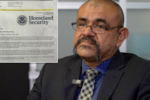SALT LAKE CITY — Utah Representative Burgess Owens has long been an advocate for educational reform, believing that America’s children should be the best educated in the world. Unfortunately, according to Owens, the current state of the U.S. public education system is far from meeting that ideal.
“Education has been turned on its head,” Owens remarked. “We have 25% to 30% of our kids not proficient in math and reading. We have kids having no idea what our history is about, so they have no pride in our past. And we have this idea that we can now judge each other based on skin color — that’s what we got away from 60 years ago.”
He believes the solution lies in providing families with the power to choose the best educational path for their children. “And school choice,” he said, “is the only way to go.”
To further this mission, Owens, along with other Republican lawmakers, has reintroduced the Educational Choice for Children Act (ECCA). This proposed legislation is designed to provide financial incentives to individuals and businesses that contribute to nonprofits offering education scholarships for students.
If passed, the legislation would allocate up to $10 billion annually for K-12 students. These funds could be used for public, private, or homeschooling expenses, covering tuition, fees, and supplies.
Owens believes that this legislation is just a small step towards ensuring that all children, regardless of zip code, race, or background, have access to educational opportunities. “No matter what zip code, what race, what background — every child should have a choice,” he stressed.
Key Features of the Educational Choice for Children Act:
- $10 billion in annual tax credits available to individuals and businesses contributing to Scholarship Granting Organizations (SGOs).
- The credits would be allocated on a first-come, first-serve basis, with a base amount set for each state.
- The legislation includes guidelines for SGOs, ensuring that scholarships are awarded without bias.
- Eligible students must come from households with income not exceeding 300% of the area median gross income.
- SGOs will be responsible for managing the scholarships and ensuring they are allocated properly.
Owens’ strong stance on school choice stems from his own personal experiences. Growing up in the Deep South, he learned that education was the key to success and respect, particularly in the Black community. “My parents and several relatives were educators,” Owens recalled. “They believed that if they could raise a generation of kids who could think, compete, be articulate, and be patriotic, then they would command respect.”
However, Owens has observed that education in America has deteriorated over the past six decades. “America’s businesses function best when they compete for customers,” he said, pointing out that meritocracy is key to success in the corporate world. “The only industry that hasn’t applied this principle is education.”
The Need for School Choice
Owens argues that the education system is failing because it lacks the competition that drives improvement in other industries. He believes that school choice is the solution, allowing parents to select the best option for their children, whether it’s a local public school, a parochial school, or homeschooling.
“School choice gives parents the ability to make decisions based on what’s best for their children,” Owens explained. “For some, the best choice might be public school; for others, it might be private or homeschooling. With the scholarships provided by the ECCA, parents will have the financial resources to make the best choice.”
The proposed legislation also offers businesses and individuals a unique opportunity to invest in the nation’s future. By contributing to SGOs, they would not only help children access better educational opportunities but also receive a tax credit.
While the ECCA has garnered support from many, some critics argue that it could result in a loss of capital gains taxes, ultimately defunding public education. Owens, however, disagrees, stating that the bill does not represent a zero-sum game. “The companies win because they get a tax credit and are also investing in our kids’ future,” he said. “It benefits parents who are struggling to afford the best education for their children.”
A National Security Issue
For Owens, school choice is about more than just education; it’s a matter of national security. “Having a choice for our children to find their potential is a benefit for our country,” Owens stated. “I look at it as a national security issue.”
As the debate over the future of education continues, Owens is steadfast in his belief that school choice is the way forward. “We have to look at the education of other people’s children as an investment, not a cost,” he emphasized. “This is an investment in the future of America.”
Disclaimer – Our team has carefully fact-checked this article to make sure it’s accurate and free from any misinformation. We’re dedicated to keeping our content honest and reliable for our readers.








